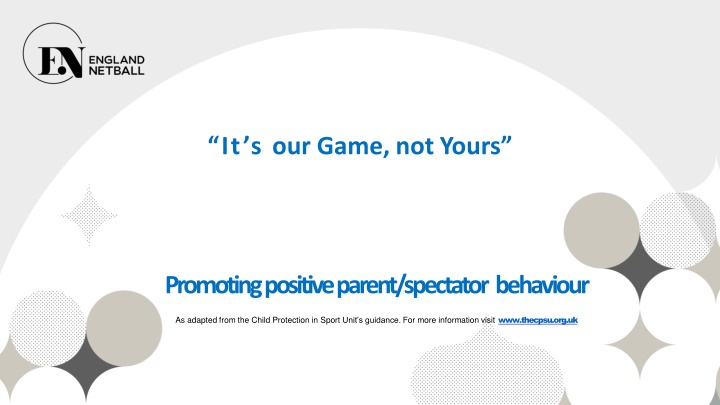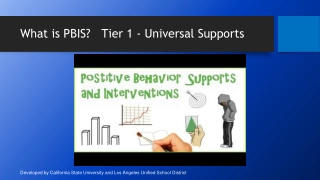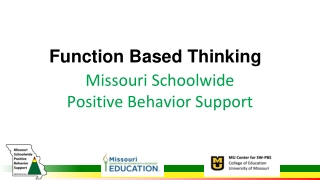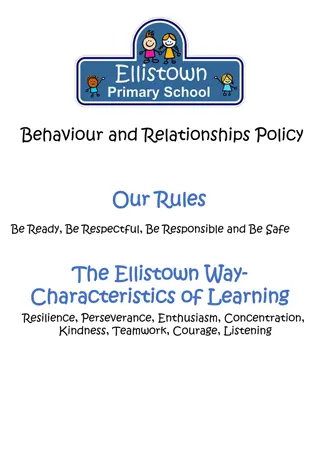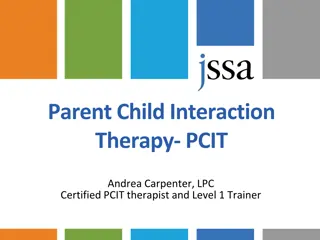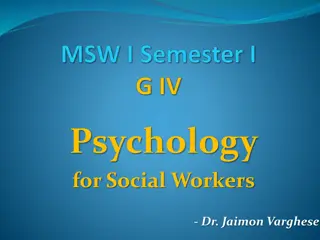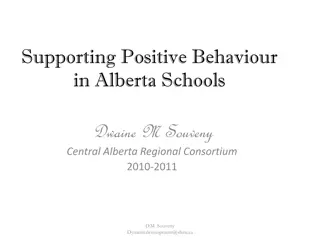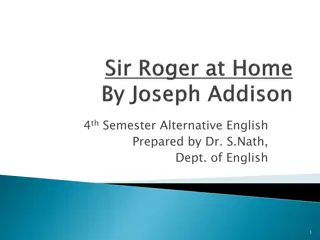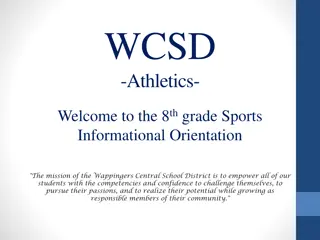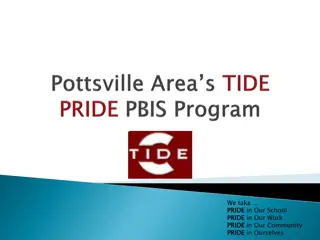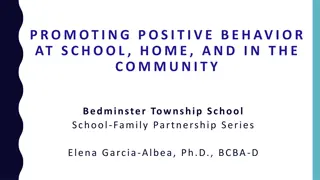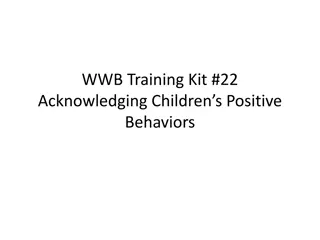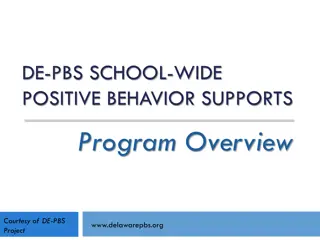Promoting Positive Parent and Spectator Behavior
Adapted from the Child Protection in Sport Unit's guidance, this content emphasizes the importance of positive parent and spectator behavior in sports settings. It discusses the benefits of parental involvement in sports, addresses challenges posed by negative behaviors, and highlights ways parents can support young athletes. Encouraging fun, skill development, and camaraderie, this material aims to create a safe and supportive environment for youth participation in sports.
Download Presentation

Please find below an Image/Link to download the presentation.
The content on the website is provided AS IS for your information and personal use only. It may not be sold, licensed, or shared on other websites without obtaining consent from the author.If you encounter any issues during the download, it is possible that the publisher has removed the file from their server.
You are allowed to download the files provided on this website for personal or commercial use, subject to the condition that they are used lawfully. All files are the property of their respective owners.
The content on the website is provided AS IS for your information and personal use only. It may not be sold, licensed, or shared on other websites without obtaining consent from the author.
E N D
Presentation Transcript
Its our Game, not Yours Promoting positive parent/spectator behaviour As adapted from the Child Protection in Sport Unit s guidance. For more information visit www.thecpsu.org.uk
AIMS to identify the benefits of parents involvement in sport to identify the nature and extent of the problem of poor parental behaviour to consider the impact of poor behaviour, especially on young people to identify how to avoid, reduce or deal with incidents.
We just want to have fun, learn new skills and make new friends...
Parents play a vital role in encouraging, enabling, and supporting young people s participation in netball - at every level
Optional exercise - Identify ways parents can: support, encourage and motivate young people who participate in netball make positive contributions to netball clubs
1 - Positive Parents may: share their enthusiasm for participation in sport encourage their child/ren to take up, enjoy and achieve in their sport provide transport, equipment, or finances support in a positive and fair way promote respect for the sport s rules, officials, their child s team-mates and opponents
2 - Positive Parents may model and reinforce positive attitudes help out with club activities become coaches or volunteers act as safeguarding officers or committee members contribute to fundraising initiatives support their child/the team at matches provide refreshments or transport
However, sometimes it is difficult to address the challenges presented by a minority of parents whose behaviour has a negative impact on their own child and other young people, and other people involved in the club.
Optional Exercise; Identify Different examples of negative parental/spectator behaviour at all levels in sport
1 - Negative Parental/Spectator Behaviour: Abusive parents verbal aggression towards own child, officials, other young people/supporters/coaches teasing/mocking of young people threats and fights with other adults and/or young people intimidation of officials including young officials some behaviours constitute criminal offences and/or child abuse
2 - Negative Parental/Spectator Behaviour: Challenging parents contradict coaches advice/instructions constant criticism of own child or other young people Win at all costs mentality encourage rule-breaking challenge club re selection, training, sanctions or ethos
Winning at all costs. Is that our dream or yours?
3 - Negative Parental/Spectator Behaviour Pushy Parents unreasonable/unrealistic expectations of their child only acknowledge winning, not child s effort, progress or enjoyment live through their child s activities Impose their aspirations on their child do not accept club sanctions for poor behaviour accept poor coaching practice for results
My mum was always supportive of me in my training but when it came to competitions she always compared me to everyone else, even when I'd done better than ever before. Unless I won it wasn't good enough
Optional Exercise Identify the ways that poor parental/spectator behaviour impacts on young people
The impact of poor parental/spectator behaviour on young people Fear Demotivation Anxiety Confusion about tactics/team role Loss of fun and enjoyment Lack of confidence Worry about how parent will behave
The impact of poor parental/spectator behaviour on young people cont. Distraction from playing sport Embarrassment Undermined authority (young officials) Sanctions imposed by club Being asked to leave the team or club Leaving the sport altogether
Sideline Bad Behaviour: Research findings Children 1st (Scotland) survey in 2012 Studied impact on young people u12 to 16+, across 34 sports. (Involved 154 young people and 340 parents)
Key research findings: Young People: Almost half (43%) had experienced this behaviour Half (47%) had witnessed behaviour towards another child Swearing/name-calling most common All felt threatened Physical abuse included pushing, kicking, hitting & spitting (included under 12s) 20% experience negatively affected their performance or made them want to quit For half it continued after sports activity ended Parents/carers: Half said their child had mentioned spectator behaviour 43% parents had witnessed bad behaviour Commonly swearing at young people, name- calling and making fun of them 68% reported that someone challenged the behaviour A quarter would not know what to do
(Optional) Exercise Identify practical steps that netball clubs and sports organisations can (or do) take to prevent, reduce and manage poor parental behaviour.
1) Adopt a whole club/sport/organisation approach, supported by team or club management 2) Arrangements are in place to clarify, publicise and promote expectations of side-line behaviour, eg: - Code of Conduct - introductory packs and/or parent/participants meetings - registration forms - posters or leaflets - use of websites and club notice boards
Widely publicised procedures to encourage reporting and responding to alleged poor behaviour in a fair and transparent way Recording systems to capture, monitor and map developing concerns Support to individuals (adults or young people) raising concerns Reporting to/support from netball governing body to club A range of clear sanctions for poor behaviour Increased monitoring, support and policing of individuals or groups identified as representing a problem Wherever possible, actions taken should not impact on the ability of a young person to continue to participate
Young people tell us they want.. their voices to be heard a focus on enjoyment rather than winning parents and coaches to have clear roles and behaviour guidelines there to be mutually agreed expectations and aspirations celebration of their successes - wider than simply winning (eg learning a new skill, playing well, trying hard)
More resources or advice England Netball safeguarding website page for parents: England Netball | I m a netball Parent or Carer (includes a document Guide for parents involved in Netball ) EN safeguarding website page for coaches: England Netball | I m a netball Coach Encouraging Parents to be Part of the Team UK Coaching Communicating with Parents UK Coaching. How to improve parental involvement in your club: recommendations for coaches | CPSU (thecpsu.org.uk).
